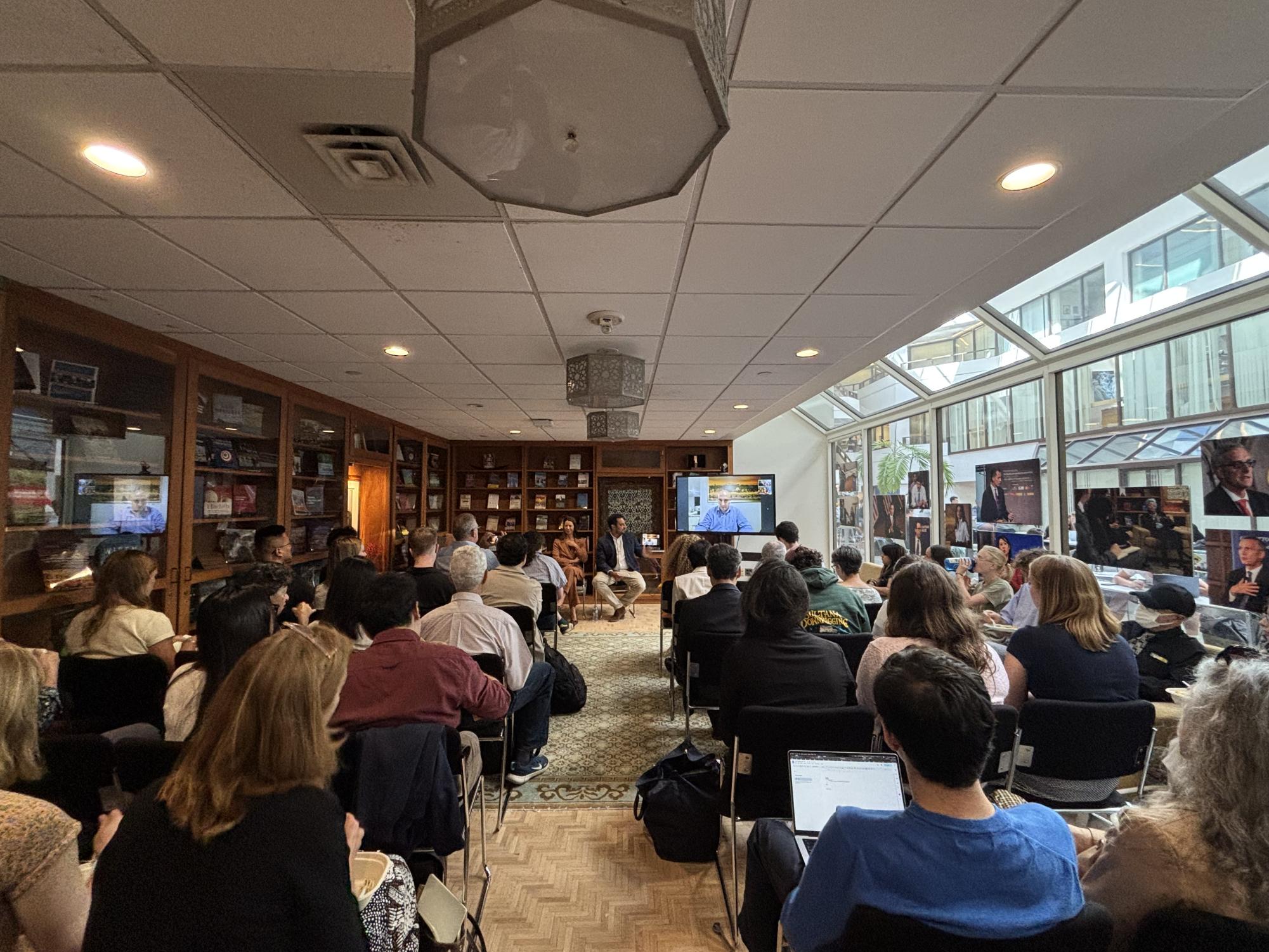Experts on Israeli and Palestinian politics argued for leadership reform and a fresh approach to Israeli-Palestinian relations amid shifting political landscapes in the United States at an event hosted by Georgetown University’s Center for Jewish Civilization (CJC) on Sept. 8.
The event brought together Samer Sinijlawi — a Palestinian political activist and the founder of the Jerusalem Development Fund, a non-profit that works to improve the lives of Palestinians in the West Bank and East Jerusalem — and Shira Efron — an Israel policy chair for the research organization RAND — for a discussion on the future of Israeli and Palestinian politics during the ongoing war in Gaza. Jonathan Lincoln, the CJC director, moderated the conversation.


Efron said the current Israeli government lacks broad public support since many Israelis oppose its policies.
“Most of the Israelis do not support this government, which is why we didn’t have elections until now,” Efron said at the event. “Because this government knows they’re not going to be re-elected in this forum again.”
Sinjilawi said Israeli ministers such as Bezalel Smotrich, Israel’s minister of finance, have greatly expanded the country’s control over the West Bank.
“So you can imagine the project of Smotrich in the last two and a half years as minister of finance; he took control of the civil administration,” Sinjiwali said at the event. “He changed the rules of the game completely. He’s the sovereign. He has the financial resources and he has the bureaucracy that he controls, and he acts silently, confiscating land, building new settlements.”
Smotrich also holds a position in the Defense Ministry, where he has authority over civilian affairs in parts of the West Bank, including land policy.
The event took place one week after the Trump administration’s Aug. 31 decision to suspend approval of visitor visas for Palestinian passport holders. The U.S. Department of State also announced Aug. 29 that it would deny and revoke visas for members of the Palestine Liberation Organization, a political organization that advocates for Palestinian nationalism, and the Palestinian Authority, which governs autonomous Palestinian regions in the West Bank, ahead of the United Nations General Assembly Sept. 9.
Sinjilawi said due to the recent policy changes, he could not travel to the United States to attend the event in person as previously planned.
“I really wished to be able to be in person in the room today with you, but unfortunately, there was recently a freeze for Palestinian visas to the U.S.,” Sinjilawi said. “Maybe it’s a policy that was initiated and implemented by Ambassador Huckabee, who felt that this could be some kind of reaction to the new wave of international recognition to the Palestinian state.”
Currently, 147 countries recognize Palestine as a sovereign nation, with countries such as Canada, the United Kingdom, France and Australia planning to formally recognize Palestine in September. The United States does not recognize Palestine as a sovereign nation.
Efron said the United States’ decision to refuse to issue visas to Palestinians will not help resolve the ongoing conflict.
“Why undermine the Palestinians?” Efron said. “And this idea of coercion through ignoring and sanctioning the Palestinians instead of through engagement, to me, just doesn’t make sense from a U.S. perspective.”
Sinjilawi said the Palestinian Authority is disconnected from the realities faced by most Palestinians.
“This group of people are living in a bubble, and they have achieved Palestinian independence 15 years ago, and they want to maintain this, and they don’t care about what’s happening for the average Palestinian,” Sinjilawi said.
Efron said she is hopeful that the current moment marks a potential turning point in the Palestinian government.
“This moment in time does create an opportunity for the Palestinians to reclaim the Palestinian nationalism and hopefully bring the Israelis on board in the way that Samer said and start a different narrative,” Efron said.
Sinjilawi said he hopes new leadership can reframe the conflict by recognizing a shared presence instead of arguing against either group’s belonging. Exp
“It brings this conflict into a formula of who belongs and who does not belong, instead of us recognizing this historic era and demanding the Israelis that they have never been alone in this time, that there was always others and these others are us,” Sinjilawi said. “So it’s not who belongs and who does not belong. The question is, how do we both belong?”